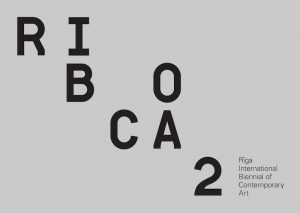The 2nd Riga International Biennial of Contemporary Art (RIBOCA2)
May 16–October 11, 2020
The Riga International Biennial of Contemporary Art is pleased to announce the curatorial concept of RIBOCA2 by Rebecca Lamarche-Vadel.
RIBOCA2 public opening: Saturday, May 16, 2020
Press and professional preview: Thursday, May 14–Friday, May 15, 2020
Humanity is now at the crossroads and all signs call for a new epoch. Seeking an alternative to the deluge of hopeless narratives, the second edition of Riga Biennial of Contemporary Art (RIBOCA2), curated by Rebecca Lamarche-Vadel, looks to re-enchantment as a frame for building desirable futures, to reimagine ways of being human in a context of deep ecological, economical and social mutation. “The end of the world” has always haunted mankind. But while in previous tales, the apocalypse was provoked by some exterior phenomenon, an asteroid or plague befalling the Earth, current scientific reports attest that humans are solely responsible for the mass extinction to come.
How can we construct an inclusive society of entangled solidarities between beings? How to reconsider our culture when it is easier to imagine the end of the world than the end of capitalism? Which mythologies could replace the narratives of progress that dominated modernity? And can art offer alternative models for the way we inhabit the Earth?
The Biennial engages with our mental landscapes, encouraging poetic reinvention, asserting the potential for art to dialogue with the challenges and complexities of the world around us. The Earth, humans, non-humans, and matters are part of a vast interconnected network in which we can no longer play a central dominating role. Our constant exchanges with other presences, from micro to macro scales, confirm our hybrid, interdependent position within the bigger assembly of the living. The notion of collective re-enchantment means listening more carefully to these rhythms, looking more closely at other trajectories, being aware of longer timescales and the invisible architectures that animate the world. Against cynicism and political despair, transforming fear into possibility and peril into exuberance, the Biennial seeks alternative actions, thoughts, and narratives in the perspective of common futures. The Biennial finds inspiration from Riga, Latvia, and the Baltics, where “worlds have ended” many times in recent and distant history. Amidst occupations, wars, and economical flux, the region has undergone radical changes and rebirths. These conditions cultivated inspired practices of resilience, amongst them poetry, ritual and song, signs of a groundswell that culminated in the surreal human chain of two million citizens, a 600 km social sculpture, linking Tallinn to Riga to Vilnius in 1989. Riga and the Baltics have also been a zone of cultural entanglement for centuries, a bridge at the confluence of territories, where sensitivities and ideologies have been assembled and enmeshed since its very inception.
The Biennial will bring together 60 visionary international and regional artists and creators whose works challenge traditional definitions of art, expanding its usual territories by working and thinking beyond disciplines. Their researches question established conventions, becoming catalysts for alternative ways of looking, listening and feeling. Spreading across Riga’s parks, former industrial sites, wastelands, domestic houses, monuments, restaurants, hotels and harbors, the Biennial, following the principles of entanglement, embraces the pulses and rhythms of the transforming ecosystem of the city.
About the curator
Rebecca Lamarche-Vadel is a French curator and writer, and former curator at Palais de Tokyo (2012–19). Her internationally critically acclaimed projects include the solo exhibitions of Tomás Saraceno, Tino Sehgal, Marguerite Humeau, Ed Atkins, David Douard, Helen Marten, François Curlet and Jon Rafman.


